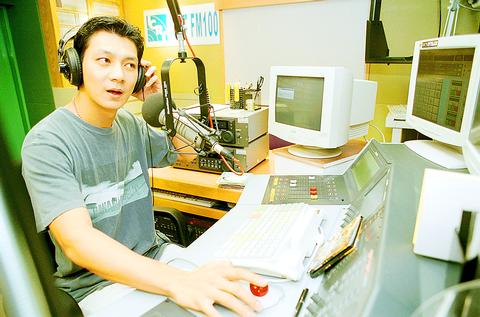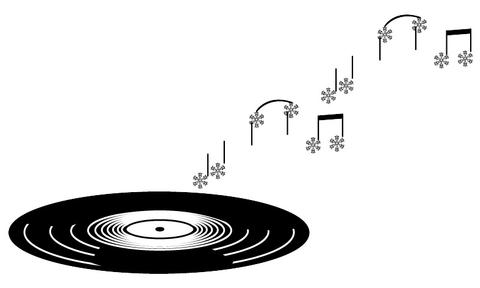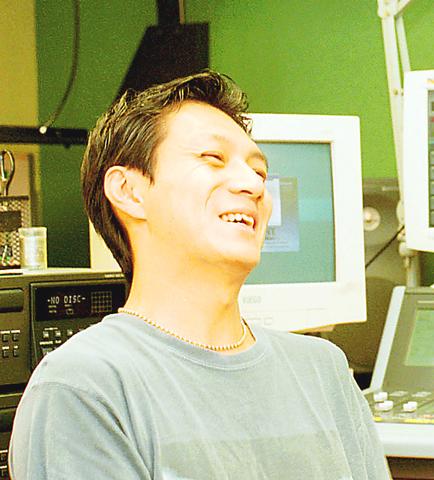IN the early evening, tucked away in an out-of-the-way recording studio at ICRT, Dennis Nieh (
He floats a few jokes on the airwaves to entertain listeners and then rolls into a satirical scene-setter, describing a movie star playing an ordinary family man.
"Michael Douglas and Catherine Zeta Jones are getting married, having babies, and picking up clothes. Douglas is gathering big bags, mall bags, everything, under his arms, around his neck and between his legs, trying to get all the clothes home."

PHOTO: GEORGE TSORNG
Nieh reaches over to the computer in front of him and seconds later the movie sound track from "Mr. Mom" fills the studio. He smiles slightly, satisfied with his shtick. He is comfortable with this routine. It is something he has been polishing for more than 10 years, since his time as a heavy metal disc jockey in northern California.
Sitting in front of a large, state-of-the-art recording system, surrounded by computers and microphones, Nieh remembers his much smaller studio in San Jose. "I had two turn tables, a mike, and a small board with 8-track carts," says Nieh, who just played music for his first DJ job.
But in Taiwan, Nieh's role has grown well beyond just spinning discs. He promotes shows at McDonald's around the island; he goes to schools and prisons to give motivational talks; he does commercials; and he even started a mini-series on TV. Currently, he is on an island tour doing stand-up comedy with Theater Company 99, cracking jokes sans music.

"People expect more of you," says Nieh, while backstage prepping for his part in the stand-up comedy "Talk Maniac." "In the States, if you are a DJ, then you are a DJ. You don't do anything else. But here, DJs publish books and get involved in other things."
Nieh was born in Taiwan and moved to the States at the age of seven. He lived in California until three years ago, after a business trip to Taiwan sparked his interest anew in the island. After about six months, he ran into ICRT's general manager, Doc Casey, at a bar. Casey invited him to work at ICRT and that was the night he stepped up to a career in the spotlight, winding up as the sedate and sometimes sarcastic voice behind "Taiwan Tonight," a window into local scenes colored with music and spiced up with entertainment news.
The show has earned Nieh quite a following. He gets about 80 e-mails a day from fans, some of which he answers with the rest being read on his live program. He also weaves in bits of infotainment gleaned from the local press between a steady run of popular American songs and a few local acts.

PHOTO: GEORGE TSORNG
"Through my program what I want to create is an environment," says Nieh. "What makes a program humorous and fun to listen to is personality. That's why you add a little personality spice to make it interesting. That's what binds all the elements together to make it work."
What Nieh is tackling today as a DJ is a lot more sophisticated than what he did on his first broadcasting job 10 years ago in San Jose. During those simpler days, Nieh would send up an endless stream of heavy metal music -- no chatter, very little personality needed. Since then, he's been riding the roller coaster of radio broadcasting, moving from heavy metal to American Top 40 to Chinese pop.
Though reserved when it comes to revealing his personal life, Nieh insists on being true to himself, even if it means trouble for him. "I will not change myself to become something else just to please other people," he says.
It may be this kind of genuineness that makes director Deng An-ning (
Or, perhaps, it's as Liu Chih-chi (
Despite his new success and his brushes with fame, Nieh still revels in memories rooted in ordinary family experiences. Like when the whole family would treat grocery shopping and cooking Chinese cabbage as a big deal. These are days he left behind on the other side of the Pacific. "The best thing that can ever happen in life is to be an ordinary person and lead an ordinary life," he says.
But ordinary seems a relatively abstract concept nowadays for Nieh. For the curtain is coming up and he's taking the stage again, this time as a comedian. Bounding off into the bright lights, he whispers: "Stay and watch."For your information: "Taiwan Tonight" airs on ICRT FM100.7 every weekday evening from 6PM to 9pm.

Even by the standards of Ukraine’s International Legion, which comprises volunteers from over 55 countries, Han has an unusual backstory. Born in Taichung, he grew up in Costa Rica — then one of Taiwan’s diplomatic allies — where a relative worked for the embassy. After attending an American international high school in San Jose, Costa Rica’s capital, Han — who prefers to use only his given name for OPSEC (operations security) reasons — moved to the US in his teens. He attended Penn State University before returning to Taiwan to work in the semiconductor industry in Kaohsiung, where he

On May 2, Chinese Nationalist Party (KMT) Chairman Eric Chu (朱立倫), at a meeting in support of Taipei city councilors at party headquarters, compared President William Lai (賴清德) to Hitler. Chu claimed that unlike any other democracy worldwide in history, no other leader was rooting out opposing parties like Lai and the Democratic Progressive Party (DPP). That his statements are wildly inaccurate was not the point. It was a rallying cry, not a history lesson. This was intentional to provoke the international diplomatic community into a response, which was promptly provided. Both the German and Israeli offices issued statements on Facebook

May 18 to May 24 Pastor Yang Hsu’s (楊煦) congregation was shocked upon seeing the land he chose to build his orphanage. It was surrounded by mountains on three sides, and the only way to access it was to cross a river by foot. The soil was poor due to runoff, and large rocks strewn across the plot prevented much from growing. In addition, there was no running water or electricity. But it was all Yang could afford. He and his Indigenous Atayal wife Lin Feng-ying (林鳳英) had already been caring for 24 orphans in their home, and they were in

Australia’s ABC last week published a piece on the recall campaign. The article emphasized the divisions in Taiwanese society and blamed the recall for worsening them. It quotes a supporter of the Taiwan People’s Party (TPP) as saying “I’m 43 years old, born and raised here, and I’ve never seen the country this divided in my entire life.” Apparently, as an adult, she slept through the post-election violence in 2000 and 2004 by the Chinese Nationalist Party (KMT), the veiled coup threats by the military when Chen Shui-bian (陳水扁) became president, the 2006 Red Shirt protests against him ginned up by